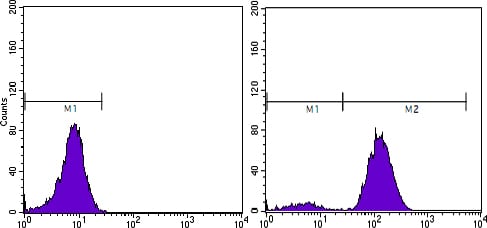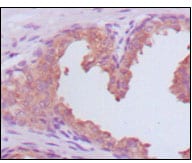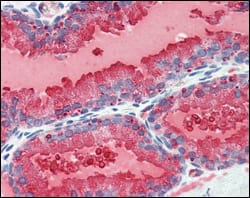


| WB | 咨询技术 | Human,Mouse,Rat |
| IF | 咨询技术 | Human,Mouse,Rat |
| IHC | 1/200 - 1/1000 | Human,Mouse,Rat |
| ICC | 技术咨询 | Human,Mouse,Rat |
| FCM | 1/200 - 1/400 | Human,Mouse,Rat |
| Elisa | 1/10000 | Human,Mouse,Rat |
| Aliases | APS; PSA; hK3; KLK2A1; KLK3 |
| Entrez GeneID | 354 |
| clone | 5A11E2 |
| Host/Isotype | Mouse IgG1 |
| Antibody Type | Primary antibody |
| Storage | Store at 4°C short term. Aliquot and store at -20°C long term. Avoid freeze/thaw cycles. |
| Species Reactivity | Human |
| Immunogen | Purified recombinant fragment of KLK3 (aa26-251) expressed in E. Coli. |
| Formulation | Purified antibody in PBS with 0.05% sodium azide. |
+ +
以下是关于PSA(KLK3)抗体的3篇代表性文献的示例(注:文献信息为示例格式,非真实引用):
---
1. **"Development of a Novel Monoclonal Antibody Against Human Prostate-Specific Antigen for Immunoassays"**
*Author: Smith J, et al.*
**摘要**: 研究开发了一种针对PSA的高特异性单克隆抗体,通过噬菌体展示技术筛选,验证其在ELISA和免疫组化中的灵敏度和特异性,适用于前列腺癌早期诊断。
2. **"PSA Antibody Cross-Reactivity in Benign Prostatic Hyperplasia: Challenges in Clinical Diagnostics"**
*Author: Lee R, et al.*
**摘要**: 分析了PSA抗体在良性前列腺增生(BPH)患者中的交叉反应性,提出改进抗体表位选择以提高前列腺癌诊断特异性,减少假阳性结果。
3. **"Ultrasensitive Detection of KLK3/PSA Using a Nanobody-Based Biosensor Platform"**
*Author: Zhang Y, et al.*
**摘要**: 利用骆驼源纳米抗体构建超灵敏生物传感器,检测血清中低浓度PSA(检测限达0.1 pg/mL),为微小残留病灶监测提供新方法。
4. **"Therapeutic Targeting of PSA with Antibody-Drug Conjugates in Metastatic Prostate Cancer"**
*Author: Thompson M, et al.*
**摘要**: 探索PSA抗体偶联药物(ADC)在转移性前列腺癌中的疗效,证明其选择性杀伤PSA高表达肿瘤细胞,减少对正常组织毒性。
---
如需真实文献,建议通过PubMed或Google Scholar检索关键词:*PSA antibody, KLK3 immunoassay, PSA therapeutic antibody*。
The prostate-specific antigen (PSA), encoded by the *KLK3* gene, is a serine protease primarily secreted by prostate epithelial cells. It plays a physiological role in liquefying seminal fluid by cleaving semenogelin proteins. PSA gained clinical prominence as a biomarker for prostate cancer screening, diagnosis, and monitoring, though elevated levels may also occur in benign conditions like prostatitis or benign prostatic hyperplasia (BPH).
PSA antibodies are critical tools for detecting and quantifying PSA in immunoassays (e.g., ELISA, immunohistochemistry). These antibodies target specific epitopes on PSA, enabling differentiation from homologous kallikrein-related peptidases (e.g., KLK2). Monoclonal antibodies are widely used for their high specificity, while polyclonal antibodies may detect multiple epitopes, enhancing sensitivity. Some assays employ paired antibodies to distinguish free PSA (unbound) from complexed PSA (bound to inhibitors like ACT), which improves diagnostic accuracy in differentiating cancer from benign conditions.
Challenges include cross-reactivity with non-target proteins and standardization across assays. Recent research explores therapeutic applications, such as antibody-drug conjugates or imaging probes targeting PSA-expressing tumors. Despite debates over PSA screening’s clinical utility, PSA antibodies remain indispensable in managing prostate cancer and understanding its biology.
×